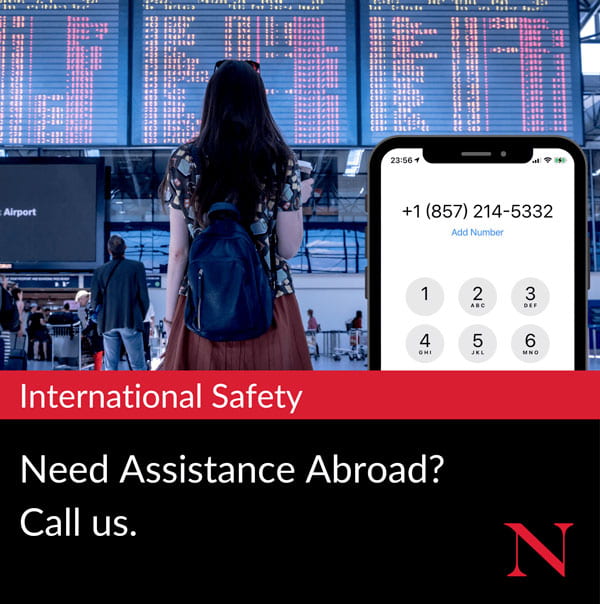Experiencing an Emergency?
Please contact your local emergency services (i.e. 911, 999, 112) prior to contacting the Global Safety and Support Network (GSSN). If unsure if you should contact emergency services, you can contact GSSN to discuss.
Global Safety and Support Network (GSSN)
Northeastern has partnered with some of the top names in travel security and medical assistance to provide our community with valuable tools and resources, wherever their travels may take them.
We’ve Made the Switch!
Beginning 1 September 2020, WorldAware services and the WorldCue App have been replaced with the Global Safety and Support Network, which is supported by Crisis24, a GardaWorld company.

By calling the 24/7 Global Safety & Support Network (GSSN) 24/7 hotline, you have access to assistance and information from our trusted partners.
The Global Safety Office (GSO) will be notified of your call so we can provide and coordinate additional Northeastern resources as required to best assist you!
Crisis24, a GardaWorld Company
Part of the world’s largest privately-owned security service, Crisis24, a GardaWorld company, produces essential intelligence via e-mail alerts for Northeastern travelers regarding events and incidents that may impact their itineraries. Crisis 24 also powers the university’s travel registry, and has a security response team available 24/7 that can support travelers in an emergency. This information can be accessed 24/7 through the travel registry, their app, or by calling the GSSN hotline at +1.857.214.5332 or +44.20.3467.1773
Global Medical Assistance
You don’t get to choose where or when you require urgent medical attention. That’s why we’ve partnered with Crisis 24’s global medical operations team, formerly the Collinson Group, to provide 24/7 medical assistance and guidance to Northeastern travelers. By simply calling the GSSN hotline at +1.857.214.5332 or +44.20.3467.1773, you will be connected to one of their operators who can help you find the right solutions for your medical needs! There is always a member of the medical team on standby should you wish to speak with them.
If there are costs associated with your medical care, please visit the Insurance page for additional information about coverage details, exclusions, and other important information.